Tumpline May 2015
Published: Tue, 05/12/15
Get news, announcements, and the latest camp scoops in our newsletter. View a web version of this issue
 |
|
 |
|
Maison-de-Pierre, 1957 Part V Andy Webster
John Blachford drove up to Camp Nominingue on a Friday and by noon the next day, we had decided to embark on a more ambitious canoe trip than either of us had ever been on. This decision on my part meant that I must quit my counselling job, but the money I would have to forfeit was inconsequential when I compared it to the overall experience of the trip we were to take. The following is an account of the 14 days we spent out in the bush.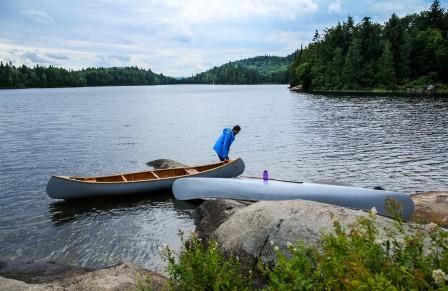 Saturday, August 10 We had learned that there existed a camp site on the tip of the peninsula and, as it was starting to get quite dark, we stopped at this particular camp site to see if it would serve our purposes for the night. Upon arrival, we found that there were an unusual number of mosquitos winging around! Bough beds had recently been spread on the ground and the site looked very good. But then the many millions of mosquitos that had been buzzing furiously around our ears attacked us with vengeance. They had all of a sudden discovered that human blood and flesh was a delectable and tasty treat. With this in their idiot minds, they proceeded to take merciless runs at us. We tried slapping them and waving our arms wildly, but when this did not work, we stumbled and ran for our canoe, and decided that the growing darkness would be a more welcome companion than a host of mosquitos. Never have I seen them worse than they were that night! 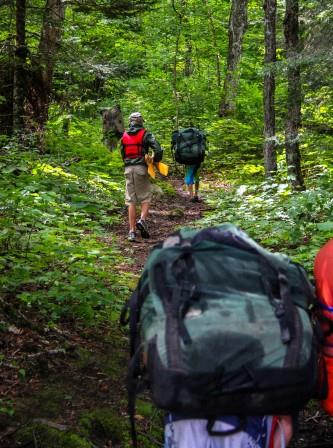 We paddled quickly towards the sound of the rushing water of the dam and made out, in the twilight, the outlines of two houses on the shore. After landing at a wharf, I walked up to what I thought was a deserted old house and opened the door, to find four men sitting quietly in the dark. One, who spoke English quite well, told me that we could use the cabin beside the house and the wood supply which was piled in a small shack beside it. We were surprised and at happy at our good fortune, not to mention the fact that we saw not one single mosquito by the dam! 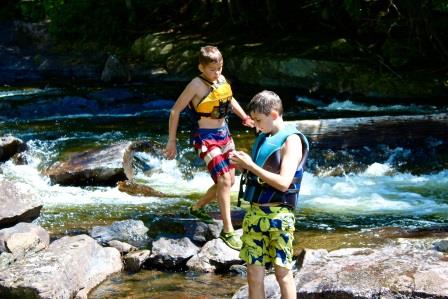 There were beds and a stove in the cabin, and we lighted our candles so that we could prepare supper. The moon was beautiful and rich and full, and gave off so much light that it was possible for me to chop a great quantity of wood for the stove. We both had an excellent sleep that night and felt good because we had paddled a very great distance of water that day. We had, in fact, paddled thirty miles by canoe. Bouldering Wall – Bloc d’escalade
In 2011, we installed our 30 foot climbing wall in the area where the old clay tennis courts were located. Climbing has been a popular and exciting addition to our instruction program. This summer, we decided to expand the climbing program with the addition of a bouldering wall, 10 feet high and 48 feet long. We are definitely excited to climb the bouldering wall! En 2011, nous avons installé notre mur d’escalade de 30 pieds dans l’espace où se trouvaient nos vieux terrains de tennis de terre battue. Depuis, l’escalade est devenue un élément important dans notre programmation. Cet été, nous avons décidé d’améliorer ce programme en ajoutant un bloc d’escalade de 10 pieds de hauteur avec un périmètre de 48 pieds. Nous avons hâte de grimper sur ce bloc! What NOT to do with your paddle from Fishell Paddles
At Nominingue, every camper picks up a paddle at least once during his stay at camp. This advice, taken from the Fishell Paddles website is worth a read…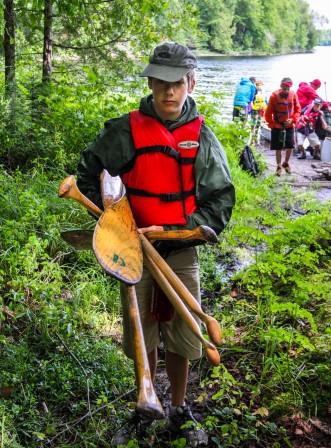
Personal Project: Making a Paddle I Alexander Meyers
Alexander Meyers has been a camper for the last two summers and is returning to Nominingue in 2015 in the LIT program. He lives in Holland. As part of a school project, he chose to make a paddle and write about this project.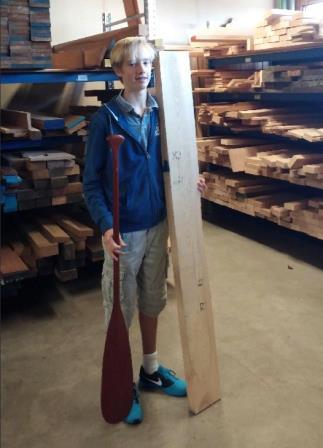 Goal Before I was certain about the subject of my project, my general goal was to find something that would truly be interesting to me. I wanted to be able to commit to a project that I would feel passionate about. Before I was certain about the subject of my project, my general goal was to find something that would truly be interesting to me. I wanted to be able to commit to a project that I would feel passionate about. I knew that if the subject were of a real personal interest to me, then I would be prepared to work a lot harder on it. Also, I knew that I would then have a more enjoyable time while working on the project, which would also drive me to work harder. When I had finally chosen my project, I established a new goal, which was to strive to create the best canoe paddle I possibly could, within the time available before the deadline. 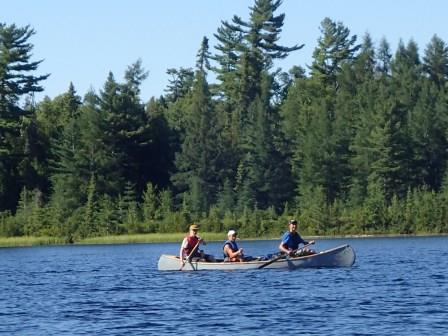 Context As global context I chose Orientation in Space and Time. I chose this context because of ideas triggered by a canoe trip I made in northern Quebec last summer, in which a group of six people in two canoes, travelled over 150 kilometres in eight days, while having no outside support or cell phone coverage. During this trip, we had to make many portages – carrying canoes and packs either from one lake to another, or to simply avoid rapids or obstacles on a river or lake – and had to navigate a challenging route using topographical maps and a compass. We had no access to signs or other directional markers and had to find and make our own campgrounds every evening. We each took with us as little as possible: two sets of clothes, a sleeping bag, a tent, pots and pans, maps, essential personal items, exactly enough food for the eight-day period and, of course, most importantly our canoes and canoe paddles. It was a true wilderness experience, and I loved it. 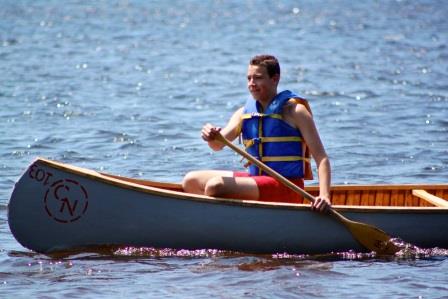 When I looked at the brand new global contexts of the MYP program and saw “Orientation in Space and Time”, I started to think about what this phrase meant. I realized that during the canoe trip I had just come back from, I had learned to orient in the space and time of the wilderness in an entirely different way than I have to do when I am in a civilised place like Amsterdam. I realised that during the canoe trip, we had to rely entirely on ourselves to get through the experience, and one of the most important things I had to help me do so was a canoe paddle. I became aware that a canoe paddle is a simple but important piece of equipment, which suddenly took on a new meaning for me during the trip; while in the urban environment I did not see a canoe paddle as being of great importance, but during the voyage I cherished my canoe paddle to be of the greatest possible value. Without it I would have been dead weight, a mere passenger on the trip. With my canoe paddle, I was in control, part of the team and could make a difference as to how fast we went, and where. I know that I will go on another long canoe trip next summer, and wanted to make my own paddle to use on that journey. My enjoyment in making things with my hands and resulting interest in woodworking also influenced my choice in deciding to make a canoe paddle. I think that an important point was that I wanted to make something that I could touch and use in real life, rather than something digital. Wild Animals I have Known J.R. Warren
From The Totem Pole, CN Alumni Journal Spring 1951I well remember Robert ‘Pappy’ Sproule. We first met several years before he ever came to Nominingue, and from the first, ours was a most interesting relationship – we could not stand each other! When, after this, I heard that Bob was to join us at camp, it occurred to me that the directors must have taken leave of their senses. I knew that, with the advent of the Sproule-cat, we would soon witness the disintegration of Nominingue civilization as we had known it. Time has proved how right I was! 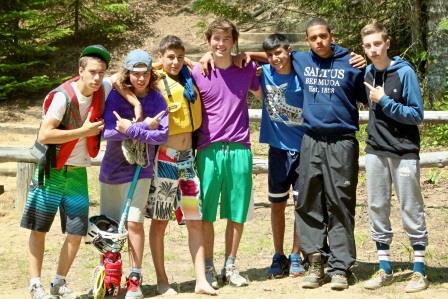 From the first day Sproule-cat set foot in camp, things did not seem right to me. He was liked by the campers, counsellors and directors, by Meo, Theo and Alec the cook, Genereux, Godard and even Fournelle! He seemed to be liked by everyone who met him – except me. Well, you can see from this that there must be something sneaky about a guy as popular as all that, and it used to annoy me to see everyone taken in by his winning ways. But he was too perfect to suit me! For instance – he professed to like swimming, diving and hiking; tennis, billiards and badminton; pingpong, croquet and shuffleboard; campers, camping and canoe trips. Now, none of this was normal! To me, it was clearly obvious that he was a spy for Powter’s Camp, and it was my duty to warn the Big Chief without delay – but I needed proof! I set out on a plan. I cultivated Bob’s friendship and outwardly we became great pals. Of course, he knew I knew he was a spy and I knew he knew I knew it, but those things are acceptable in the game of international espionage – and we were playing for high stakes: Athens versus Sparta; Powter’s versus Nominingue. 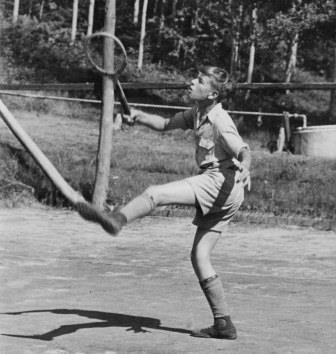 My plan was to collect all the pertinent data on Pappy that I could. Then, when I had accumulated sufficient proof of his spying activities, present them to the proper authorities and have him dismissed. So, for four years, I never let him out of my sight. We went rowing together, we went swimming together, we went hiking together, we went canoe-tripping together. We even had a ski shack together during the winter. We did everything together! Well, you can imagine that I was able to get to know Bob pretty well in all that time and, during it all, he did his utmost to become friends with me. For example, one time when we were on a canoe trip, were portaging from the Kiamika river to Lac Pimondin – a run of five hundred yards or so. I felt tired, so I stopped for a rest. Bob was very decent about things and offered to carry my canoe the rest of the way. I said that would be fine; but that I wasn’t too sure if I could make it myself. Whereupon, he offered to carry me too! Being nobody’s fool, I accepted, and off he trudged with two canoes and me on his back. Now, no one would do that without an ulterior motive. He was a spy!  I finally succeeded in catching Bob red-handed in a nefarious scheme to sabotage our fleet – and the Big Chief was a witness. Bob and I were out in a rowboat one afternoon and it tipped. It was, of course, Bob’s fault…I saw my chance! I pursued Big Chief on shore and when I caught up to him, I said: ‘Sir, you saw him! He’s trying to ruin us! He’s a Powterian spy, and he should be dismissed forthwith.’ The Big Chief was furious! So mad that the hair stood right up on the top of his head!! That’s how mad he was. Next day, I received a note from the director, inviting me, in view of my untiring efforts to apprise them of the espionage in their midst, to take an extended vacation…and leave camp. Bob Sproule lasted another five years… 2015 Spring Events – Évènements printaniers
Parent and Son Information Evenings at 7:15 PM (For new and prospective campers and their families) Tuesday May 12 Lower Canada College NDG Thursday May 14 Chimo Hotel Ottawa If you are interested in any details concerning these events, please contact us at the camp office.  Soirées d’informations pour parents et garçons à 19h15 (Pour nouveaux campeurs inscrits ou intéressés) mardi 12 mai Lower Canada College NDG jeudi 14 mai Hotel Chimo Ottawa Pour plus de détails, svp contactez le bureau du camp. Alumni Association News / Nouvelles de l’association des anciens
Please share with us news that you would like to include in the Tumpline that you think might be of interest to other Nominingue alumni.SVP envoyez nous des nouvelles que vous aimeriez inclure dans une prochaine édition du Tumpline. 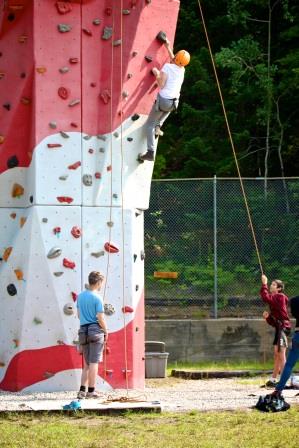 Alumni Socials Each spring and fall, we try to hold at least one Alumni Social in Montreal, Ottawa and Toronto. It is always great to renew with recent and less recent alumni. The next opportunity to re-connect will be in the spring. Dates and locations of future get-togethers will be posted on Facebook on the Nominingue Socials Group page at http://www.facebook.com/groups/NominingueSocials/. To get involved with CN Alumni Association, please contact John Christou at [email protected]. Tumpline Submissions - Soumissions pour cette lettre de nouvelles
We are looking for submissions for our newsletters from campers, staff and parents… from this summer, as well as from recent and less recent alumni. These submissions may be general memories of camp experiences or specific memories about a canoe trip, about a favourite program or a funny experience. Please send your submissions to [email protected]. You may submit your stories and memories in English, French or Spanish. Nous sommes à la recherche de textes de campeurs, parents et de moniteurs de l’été 2014… et de souvenirs de nos anciens campeurs et moniteurs des années récentes et moins récentes. Vos textes peuvent décrire vos expériences en générale ou une excursion de canot, un programme favori ou une expérience drôle. SVP envoyez votre texte par courriel à [email protected]. Votre texte peut être écrit en français, en anglais ou en espagnol. |
|
|
Camp Nominingue | Tel. 450-267-2555 | Toll-free 866-910-1551 (Canada & US)
Email: [email protected] | Web: www.nominingue.com |
|
|
This e-mail is destined to all campers, parents and counsellors, current and alumni. If you would prefer not to receive occasional messages from us, please unsubscribe using the link below this message.
Ce courriel est destiné à tous les campeurs, parents et moniteurs, actuels et anciens. Si vous voulez vous désinscrire de cette liste d’envoi, svp cliquez en bas de la page.
Camp Nominingue
Winter Address: 112 rue Lippée, Les Coteaux, QC J7X 1J4 Summer address: 1889, chemin des Mésanges, Nominingue, QC J0W 1R0 |
|